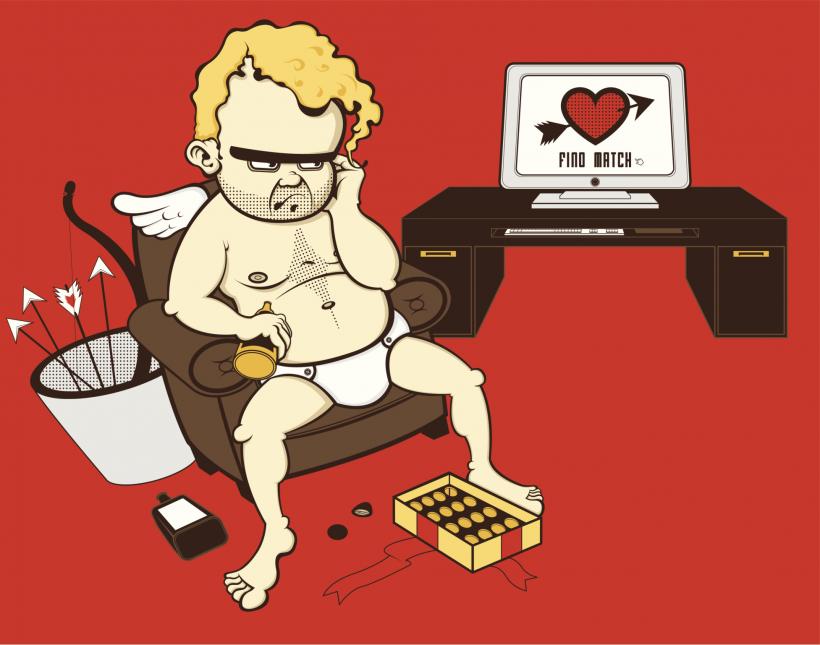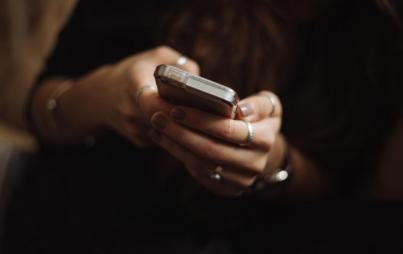
Agonizing over what kind of cool-sounding, love-inducing things to write in the “About Me” section of your OKCupid profile?
Typing a detailed, thesis-length list of your favorite music, movies, and TV shows and quirks? "I love carnitas tacos, my Alsatian, Betty, is currently the love of my life (looking ot change that!) and I might be the only English major on planet earth indifferent to grammar errors."
You're probably thinking, if they you don’t like some of the same stuff and share some of the same values or lat least think the way my brain works on the page is interesting . . . what on earth will we talk about? How will our love-rocket ever take off? Sadly, as important to you—in your mind—that a potential partner have a similar taste in prog rock, an affinity for fart jokes or an equally encyclopedic knowledge of 80s B-horror movies, your “About Me” section is probably going unread, and you’re probably not reading theirs either.
In the early stages of attraction and even a fledgling relationship, looks trump personality. Many of us might believe we want to meet someone “nice” with a “sparkling personality,” but mostly, deep, deep down in the primal crevices of our brains, online daters just want to bone hotties. In the virtual universe, the Online Hottie with a blank profile is more likely to get a swipe right than someone who may be less attractive (according to your personal taste) but common interests and an engaging personality. Case in point? Tinder.
Tinder has a rumored following of 50 million active users, with the average swiper spending up to 90 minutes per day on the app. Unlike sites like Match.com and eHarmony who advertise elusive and dubious claims of "secret algorithms" guaranteed to unearth you soulmate, Tinder gives the people what they want: access to maximum hotties in minimal time. Following a recent trip to Tinder’s West Hollywood offices, New York Times writer Nick Bilton said that Tinder believes “visual cues” are the key to online dating:
“When was the last time you walked into a bar and someone said, ‘Excuse me, can you fill out this form and we’ll match you up with people here?’ That’s not how we think about meeting new people in real life,” Sean Rad, co-founder and chief executive of Tinder, told Bilton.
No. You look across the bar and think, "damn, I'd like to take their clothes off." Not, "I wonder if they like Alsatians and good whiskey." Jessica Carbino, Tinder's in-house dating and relationship expert also explains that while instant physical attraction seems ostensibly shallow there is actually much subtle elements at play echoes these sentiments:
"Research shows when people are evaluating photos of others, they are trying to access compatibility on not just a physical level, but a social level,” said Jessica Carbino, Tinder’s in-house dating and relationship expert. “They are trying to understand, ‘Do I have things in common with this person?"
Bilton explains that "Tinder users decoded an array of subtle and not-so-subtle traits before deciding which way to swipe. For example, the style of clothing, the pucker of the lips and even the posture . . . tell us a lot about their social circle, if they like to party and their level of confidence."
However, it’s important to note that Tinder isn’t real life. Sites like Tinder present us with nearly unlimited choices and the freedom to “rate” these people anonymously, which, as far as my reality goes, doesn't get to happen offline. Complicating things further is many people on Tinder are looking for board the train to pound town, so physical attraction culminating in all kinds of penetration is all they're after.
But the stats don't lie. Personality-based dating apps like Willow will probably never match Tinder’s level of popularity; the question remains however— how many people who are "engaging" with the app actually "engage" in coitus and meaningful relationships? Just because people are swiping doesn't mean they're dropping trou. Or popping the question. How many Tinder "Matches" result in actually Matches?
Keep in mind that if you find all of this horribly depressing—i.e., I'm not conventionally attractive and my face is going to be a bona fide blur of left-swipes—"attractiveness" is, of course, a completely nebulous, wonderfully subjective quality.
As Tracey Moore of Jezebel writes:
“This doesn't mean that success in relationships relies on great symmetry or a photogenic face[...]scanning pictures only is not the hedonistic popularity contest it appears to be. For one thing, what people may be looking for in the picture is not conventional attractiveness but the attraction that comes from a composite of other qualities.”
Everything from the way someone's eyes crinkles to the beer they're holding to their body language and depicted friend circle gives us clues as to who they are—it's not all chiseled chins and bikini shots that woo us.
Plus, the research Bilton refers to only applies to the early stages of a relationship, meaning it isn’t impossible to develop a relationship based on shared interests over time with someone who might not be conventionally “hot” to you. Those perky breasts and six-packs aren't forever, and shared values and lifestyle habits will prove to be pretty damn useful in the long run.
Before you mass delete your various profiles and weep into a box of cronuts, know that online, you’ll get an equal chance at finding your romantic someone for doing sex and eating burritos. Just keep doing you.






